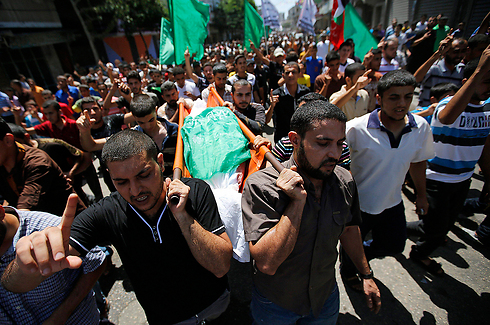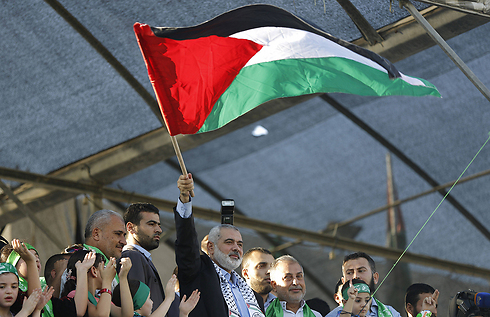
Haniyeh: Israeli admission on Deif proves war crimes charge
After defense sources in Israel admit Hamas military chief survived assassination attempt last summer, Gazan group's political leader slams Israel.
Hamas politburo chief Ismail Haniyeh responded to the reports in Israeli media outlets: "The Israeli admission of the failed assassination attempt exposes the scale of the Israeli military's frustration. The admission proves that Israel carried out war crimes that harmed civilians and United Nations facilities."
One theory as to why Deif survived suggests that one of the IAF bombs dropped on the Gaza City home in which he was staying failed to detonate, giving Deif the chance to make a speedy retreat through a tunnel. Hamas said that Deif's wife and child had been killed in the attack.
Throughout Operation Protective Edge, the Shin Bet and Military Intelligence made enormous effort to take out the Hamas military leadership, without partial success. Unlike the start of Operation Pillar of Defense in 2012, and the killing of Hamas military leader Ahmed Jabari, most of the military commanders successfully targeted in Protective Edge were in a relatively junior position.
The day after the assassination attempt on Deif, Israel assassinated three senior Hamas three members, including Raed Al-Attar, who led the abduction of Gilad Shalit, and who was also considered an expert on tunnels.
Since then, the leaders of Hamas' military wing have rallied. The organization has appointed new brigade commanders to replace the two killed – al-Atar, the brigade commander in Rafah, and Mohammed Abu Shamala, commander of the southern sector. Each Hamas brigade commander today has returned to an ordinary routine.
The defense establishment attributes its difficulties in assassinating Hamas leaders to two factors: Firstly, the group's policy of massive compartmentalization, a lesson learned from the killing of Jabari.
Secondly, the layout of the locations from which Hamas managed the fighting –civilian sites that Israel would not attack, such as hospitals and educational institutions.
In the case of Deif, Israel apparently took a calculated risk that non-combatants would be hurt in the assassination attempt, which is ultimately what happened with the deaths of his family.
More rockets, more tunnels
Not long after the operation in Gaza ended, Hamas began to renew its underground construction projects – rebuilding both offensive and defensive tunnels based on the assumption Israel was still lacking an adequate response to the threat.
The new tunnels were dug in new locations, while those unearthed or hit by Israel over the summer were disregarded and left to decay.
Hamas has even increased its investment in the tunnels, and now employs over 1,000 workers working around the clock in three shifts, six days a week. To fortify their inner walls, Hamas uses cement purchased on the black market in Gaza, in addition to wood and hard plastics.
The same can be said about the group's self-produced rocket stockpile. Recent months have seen a massive effort to replenish the group's rocket supplies to their pre-war state. There is a concentrated effort to build short-range rockets that can hit border communities, as these types of projectiles are the most effective against Israel's Iron Dome missile defense system. The group is also busy amassing long range rockets that can go as far as Tel Aviv or Jerusalem (roughly 75 km) and even those that can reach Haifa (150 km).
As part of Hamas' attempt to overcome Iron Dome, it is possible the group will attempt to fire multiple rockets from different locations at a single target in Israel, some of which will eventually be able to penetrate the missile defense system, which despite its impressive record is limited to a finite number of interceptions per battery.
Yoav Zitun contributed to this report.












